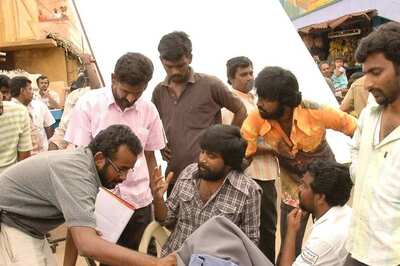
views
However, increasingly the strains on this strategic alliance are beginning to appear. As Bush's approval ratings plummet at home, the pressure has escalated on Musharraf to deliver tangible results quickly. The General faces a difficult dilemma: By continuing to align himself with the US, his own domestic support wanes rapidly. On the other hand, by distancing himself from the US his position may become dispensable. As Musharraf puffs his humidor cigar, this is the Hobson's choice that torments him.
Ironically, there comes a time when even a dictator cannot ignore the public mood. The erosion of authority is a nightmare for all politicians, especially for a man in uniform. Musharraf is no exception. He has begun to make noises about covert US strikes in Pakistani territory warning of a violation of sovereignty. Recently, in an interview he combatively asserted, "I'm nobody's poodle!"
In a year from now, general elections are scheduled in Pakistan. Living as we are, as Salman Rushdie puts it, in an age of "permeable frontiers", the outcome of those elections in 2007 will matter not just to the Pakistani people but also to outsiders. This is the inevitable result of Pakistan's frontline status in the battle against Islamic extremists.
At a press conference during George Bush's visit to Pakistan earlier this year, Musharraf ventured clear from outlining whether he would run for office in the next elections or even if he were to run, whether he would relinquish his uniform. The General insisted "I am following constitutional norms where I have been allowed to wear this uniform until 2007...beyond 2007, yes this is an issue which has to be addressed..." Crucially, he did not rule out an extension either.
If Pakistan's history is an indicator then Musharraf will not cede his uniform easily. The overwhelmingly destructive extra-constitutional role that the Pakistani army has played in stultifying Pakistan's evolution is critical to understanding the country's political uncertainty. The suggestion of a military elite fettering, or even overriding civilian discourse may be unimaginable to readers in India but in Pakistan, it is everyday business. Political structures have been fractured by intermittent military dictatorships; democracy and the rule of law are treated as a minor inconvenience by the army.
The result of the Pakistani army's overt interference in civil society and complicity in encouraging the proliferation of radical seminaries - particularly during Zia's rein - has been a gradual decline in the country's fortunes. In a list of "failed states" published this month by the reputable journal, Foreign Policy, Pakistan ranks 9th. The indicators of instability taken into consideration in preparing this survey include among others, a record of a nation's human rights, group grievance and delegitimisation of the state. It isn't exactly a glowing honour-board.
Should Indians care? Yes, because coping with turmoil in a neighbouring state entails a level of resource allocation that might be usefully deployed elsewhere. The unpredictable and mercurial events across the Wagah border matter because a stable Pakistan is also in India's interest.
Vitally though, there is a section of society in Pakistan that is capable of introspection and is driven by a belief that a lasting peace with India is in the Pakistani interest. For instance Irfan Husain, of The Dawn acknowledges "remove the '9-11 factor', and we are left with a dysfunctional state in terminal decline...unless we face reality unflinchingly we will be unable to see why the rest of the world views us as it does. Equally importantly, we need to see India's rise not in relation to Pakistan but as an important regional and global event in its own right.".
General Musharraf's espousal of "enlightened moderation" as a prescription for Pakistan and a stricter regulation of religious seminaries is a progressive move. However, unfortunately he offers no long-term solutions towards a permanent delineation of the army from Pakistan's constitutional affairs. Indeed, it is difficult to visualise him endorsing the army's retreat from its entrenched sphere of influence. The General is wary of public opinion but it is the mutinous murmur from the barracks that he fears the most.
The regular interventions of the Pakistani army under the self-serving canard of "national security" have ruptured the institutions of state and wreaked socio-economic havoc on the Pakistani people. Perpetual military dictatorship estranges people from the mainstream and fuels civil strife. If Pakistan is to disprove its reputation as a "failed state", an orderly return to substantive democracy and civilian governance is probably its best hope.
Rishabh Bhandari is a lawyer at a global law firm in London. These are his personal views.
first published:May 15, 2006, 19:47 ISTlast updated:May 15, 2006, 19:47 IST
window._taboola = window._taboola || [];_taboola.push({mode: 'thumbnails-mid-article',container: 'taboola-mid-article-thumbnails',placement: 'Mid Article Thumbnails',target_type: 'mix'});
let eventFire = false;
window.addEventListener('scroll', () => {
if (window.taboolaInt && !eventFire) {
setTimeout(() => {
ga('send', 'event', 'Mid Article Thumbnails', 'PV');
ga('set', 'dimension22', "Taboola Yes");
}, 4000);
eventFire = true;
}
});
window._taboola = window._taboola || [];_taboola.push({mode: 'thumbnails-a', container: 'taboola-below-article-thumbnails', placement: 'Below Article Thumbnails', target_type: 'mix' });Latest News
In the altered reality of the post 9-11 era, perhaps no politician has benefited as much as General Musharraf. As Pakistan's strategic importance became apparent in the "war against terrorism", Musharraf shrewdly seized his opportunity to join hands with the US. The fruits of this friendship yielded immediate dividends: The overthrow of an elected government was overlooked and a dictator smoothly assumed his place among the high table of global statesmen.
However, increasingly the strains on this strategic alliance are beginning to appear. As Bush's approval ratings plummet at home, the pressure has escalated on Musharraf to deliver tangible results quickly. The General faces a difficult dilemma: By continuing to align himself with the US, his own domestic support wanes rapidly. On the other hand, by distancing himself from the US his position may become dispensable. As Musharraf puffs his humidor cigar, this is the Hobson's choice that torments him.
Ironically, there comes a time when even a dictator cannot ignore the public mood. The erosion of authority is a nightmare for all politicians, especially for a man in uniform. Musharraf is no exception. He has begun to make noises about covert US strikes in Pakistani territory warning of a violation of sovereignty. Recently, in an interview he combatively asserted, "I'm nobody's poodle!"
In a year from now, general elections are scheduled in Pakistan. Living as we are, as Salman Rushdie puts it, in an age of "permeable frontiers", the outcome of those elections in 2007 will matter not just to the Pakistani people but also to outsiders. This is the inevitable result of Pakistan's frontline status in the battle against Islamic extremists.
At a press conference during George Bush's visit to Pakistan earlier this year, Musharraf ventured clear from outlining whether he would run for office in the next elections or even if he were to run, whether he would relinquish his uniform. The General insisted "I am following constitutional norms where I have been allowed to wear this uniform until 2007...beyond 2007, yes this is an issue which has to be addressed..." Crucially, he did not rule out an extension either.
If Pakistan's history is an indicator then Musharraf will not cede his uniform easily. The overwhelmingly destructive extra-constitutional role that the Pakistani army has played in stultifying Pakistan's evolution is critical to understanding the country's political uncertainty. The suggestion of a military elite fettering, or even overriding civilian discourse may be unimaginable to readers in India but in Pakistan, it is everyday business. Political structures have been fractured by intermittent military dictatorships; democracy and the rule of law are treated as a minor inconvenience by the army.
The result of the Pakistani army's overt interference in civil society and complicity in encouraging the proliferation of radical seminaries - particularly during Zia's rein - has been a gradual decline in the country's fortunes. In a list of "failed states" published this month by the reputable journal, Foreign Policy, Pakistan ranks 9th. The indicators of instability taken into consideration in preparing this survey include among others, a record of a nation's human rights, group grievance and delegitimisation of the state. It isn't exactly a glowing honour-board.
Should Indians care? Yes, because coping with turmoil in a neighbouring state entails a level of resource allocation that might be usefully deployed elsewhere. The unpredictable and mercurial events across the Wagah border matter because a stable Pakistan is also in India's interest.
Vitally though, there is a section of society in Pakistan that is capable of introspection and is driven by a belief that a lasting peace with India is in the Pakistani interest. For instance Irfan Husain, of The Dawn acknowledges "remove the '9-11 factor', and we are left with a dysfunctional state in terminal decline...unless we face reality unflinchingly we will be unable to see why the rest of the world views us as it does. Equally importantly, we need to see India's rise not in relation to Pakistan but as an important regional and global event in its own right.".
General Musharraf's espousal of "enlightened moderation" as a prescription for Pakistan and a stricter regulation of religious seminaries is a progressive move. However, unfortunately he offers no long-term solutions towards a permanent delineation of the army from Pakistan's constitutional affairs. Indeed, it is difficult to visualise him endorsing the army's retreat from its entrenched sphere of influence. The General is wary of public opinion but it is the mutinous murmur from the barracks that he fears the most.
The regular interventions of the Pakistani army under the self-serving canard of "national security" have ruptured the institutions of state and wreaked socio-economic havoc on the Pakistani people. Perpetual military dictatorship estranges people from the mainstream and fuels civil strife. If Pakistan is to disprove its reputation as a "failed state", an orderly return to substantive democracy and civilian governance is probably its best hope.
Rishabh Bhandari is a lawyer at a global law firm in London. These are his personal views.


















Comments
0 comment